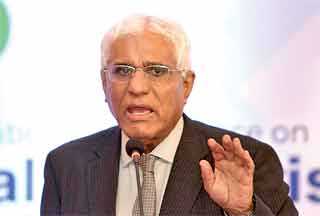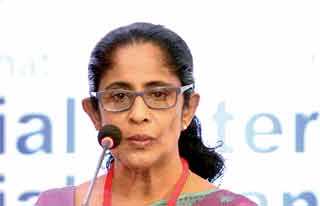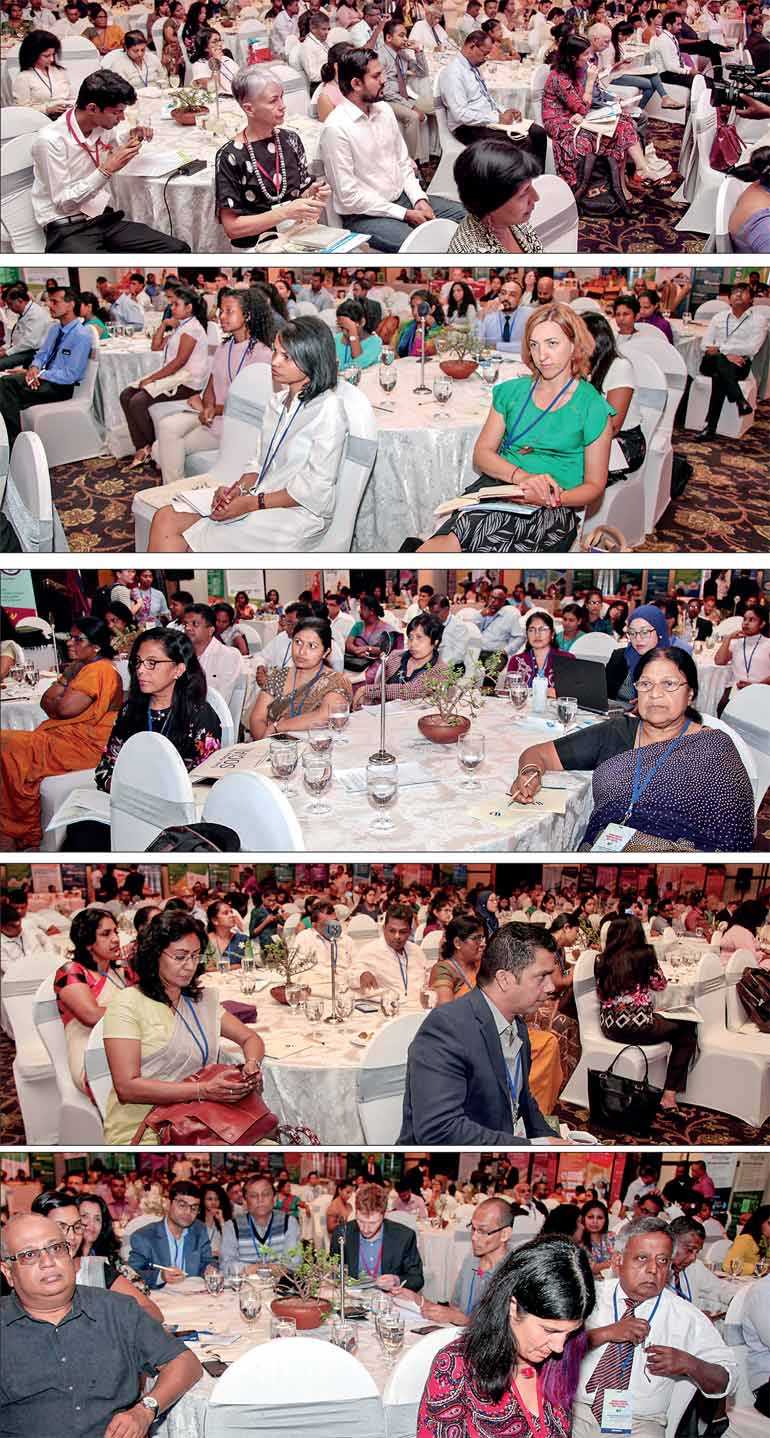Friday Feb 27, 2026
Friday Feb 27, 2026
Tuesday, 29 January 2019 01:41 - - {{hitsCtrl.values.hits}}
By Charumini de Silva
Central Bank Governor Dr.Indrajit Coomaraswamy yesterday called for a concerted effort by all stakeholders to establish policies and systems to support the growth of emerging social enterprises in Sri Lanka, insisting that the country had great untapped potential to develop the sector. “Sri Lanka still has great deal of untapped potential in developing social enterprises. However, to achieve this, a more dynamic approach which entails a combined effort of all stakeholders including both State and private entities, while following a cohesive policy framework, is required to match available resources with the needs of the sector,” he said at the 2nd International Conference on ‘Social Enterprise and Social Finance’ at Waters Edge yesterday.The two-day conference titled ‘Think social, Produce social and Buy social’ was organised by the British Council Sri Lanka and Lanka Social Ventures, with an aim to build a social enterprise ecosystem and to help enterprises and SMEs to scale up and create a social impact.
“The task of transforming our economy into a social enterprise economy continues to be challenging. The role of social enterprises in social inclusion, livelihood development and poverty reduction has room for improvement. Although there have been advances, several bottlenecks still persist thereby inhibiting the expected outcomes. The contribution of social enterprises to environmental sustainability; therefore remains below potential,” he stressed.
The Governor also pointed out that there was much scope to increase the use of financial services, technology and business support services to promote social enterprises in Sri Lanka.
Despite the numerous challenges the sector faces, Dr. Coomaraswamy said it was imperative to observe the emergence of organisations which are seeking to operate their commercial ventures to achieve the twin objectives of a social mission and profit generation.
“The prospects of social enterprises are being enhanced by the trend in consumer choices towards healthier, eco-friendly and social goods. Social buyers who are keen to buy goods and services from social enterprises are emerging as a new force. Thus, a concerted effort is needed to establish policies and systems to support the growth of emerging social enterprises in Sri Lanka,” he stressed.Although, the social enterprise sector in Sri Lanka is gathering momentum, Dr.Coomaraswamy said a range of different needs including business modelling, planning, product design, sales and marketing have to be fulfilled to uplift its contribution to the economy. “In this connection, impact investment has been recognized as key to scale up the social enterprise sector rapidly. Further, its social, environmental and economic impact needs to be assessed and reported according to global standards. Greater use needs to be made of triple bottom line accounting and social entrepreneurs need to be recognized and rewarded for their achievements at national level,” he added.
 |
Central Bank Governor Dr.Indrajit Coomaraswamy |
 |
Ministry of Industry and Commerce Secretary Ranjith Asoka |
 |
British Council Sri Lanka Director Gill Caldicott |
 |
British Council Head Programmes Sanjeevani Munasinghe |
He also acknowledged the benefits of developing a social enterprise ecosystem and support to promote and strengthen enterprises to build up their capacity for articulating the social impact. It was noted that the Central Bank, on behalf of the Government, has a mandate for targeted lending to the microfinance, SME and agriculture sectors, as well as youth and women. In implementing this mandate, the
Central Bank has been facilitating and implementing refinance schemes, interest subsidy schemes and credit guarantee schemes targeting the MSMEs.From first conference in 2017 to research and findings in 2018 to this conference British Council Sri Lanka Country Director Gill Caldicott said it is an important step in consolidation of initiative which can have transformative effect, if collectively able to persuade to think social, produce social and buy social. British Council Sri Lanka Programs Head Sanjeevani Munasinghe highlighted that resources provided to social enterprises by Government and other organisations did not adequately support the needs, aspirations and the growth of the sector in Sri Lanka. “The social enterprises that are operating in all 25 districts of Sri Lanka have adopted broad range of legal structures such as limited companies, sole proprietor and partnerships, associations, cooperatives and societies because there are no specific legal form or mechanism detailed for social enterprises to register. Banks and financial institutions had not so far recognised social enterprises as a distinct form of organisation that creates a social or environmental impact which contributes to sustainable development of goals (SDGs),” she pointed out.
The British Council Sri Lanka in partnership with Lanka Social Ventures in 2018 conducted a national survey which looked at the social enterprise sector across the country with an aim to get a better understanding of the profile of the social enterprises in the country, an estimate of the current size, scale of the social enterprises and to understand the existing eco-system which is important for the growth of the social enterprises.Outlining some of the key findings of the study, Munasinghe said social enterprises are looked upon as businesses which are responding to market demand with a social or environmental mission with many of them operating around manufacturing, agriculture, cultural, creative and environment protection sectors, where the majority of them create employment opportunities or income opportunities for vulnerable or marginalised communities that the sector is operating in. These social enterprises also work with diverse groups across the community including vulnerable children and adults, young people, women and girls and people with disabilities.
The challenges the social enterprise sector are facing include lack of funding, support during all phased of business development, finding skilled paid or volunteer staff, issue of establishing networks, supply chains and markets. The general public lack awareness about the social enterprises and the impact they make, she said.According to her, some of the social enterprises, particularly the cooperatives, have been in existence for more than 50 years, while around 30% of social enterprises have been operating for about 15 years and 38% of the social enterprises only started less than 10 years ago.Compared to the mainstream business sector, there is a high proportion of women leadership in this sector, where 31% are women. It was also noted that 47% of the leaders of the surveyed social enterprises are aged between 45-64 years and 51% of the social enterprises established up to 2000 have a founder or a leader aged between 25-44 years.
She also emphasised there is a trend of the youth taking up the social enterprise approach which could be described as a positive outcome for the country and for the future generation.Based on the findings of the survey conducted, the British Council has signed a program titled ‘Building Enterprises for Sustainable Economies’ (BESE), focusing on three areas such as awareness creation, capacity building and working with policymakers which were identified as important components of the growth of the sector.
Munasinghe said this second international conference was put together as a part of BESE project, which they were implementing with Lanka Social Ventures. In addition, the Industry and Commerce Ministry, National Policies and Economic Affairs Ministry, Science and Technology Ministry, Finance Ministry and Presidential Secretariat are also guiding the British Council and Lanka Social Ventures to achieve their project objectives.
Industry and Commerce Ministry Secretary K.D.N.Ranjith Asoka said the Ministry was implementing two loan schemes to promote SMEs and environmental friendly businesses.
“A sum of Rs. 1,800 million has been earmarked for this year for e-friendly loan schemes, where environment friendly social enterprises could reap the benefits,” he said at the 2nd International Conference on ‘Social Enterprise and Social Finance’ at Waters Edge yesterday.
According to the Secretary, Sri Lankan banks has granted over Rs. 50 billion in concessionary loans for the different kind of enterprises in 2018.
Last year the ‘Report on the State of Social Enterprises in Sri Lanka’ was launched which was conducted by the British Council Sri Lanka, United Nations Economic and Social Commission for Asia and the Pacific (UNESCAP) and Lanka Social Ventures.The UNESCAP believes social enterprises as a means of accelerating progress of the implementation of the Sustainable Development Goals (SDGs).
“Adopting a social entrepreneur mindset will soon become a necessity and a mainstream business model,” he pointed out.The survey on Social Enterprises of Sri Lanka confirms that the sector is growing rapidly, with 38% of all social enterprises set up in the past ten years. It also estimates that there are between 6,000 to 15,000 social enterprises in Sri Lanka.
“According to the study, there is a high involvement of youth and women in local social enterprises and a need for policy attention where the ministry can directly involve to support the social enterprise sector in the country at policy making level,” Asoka added.
He also noted that a study had been carried out to find out the institutions and legal barriers that hinder SME development in the country, where the recommendations have been proposed.
In addition he said the Government had introduced different loans schemes under ‘Enterprise Sri Lanka’ towards developing the enterprises in common.
Pic by Chamila Karunaratne
